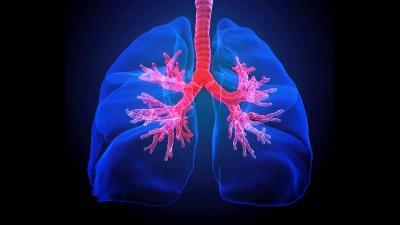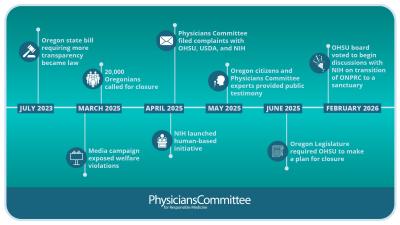For Greater Success in the Clinic, NIH Must Overcome Its Reliance on Animals

The National Institutes of Health (NIH) is increasingly recognizing the serious scientific and ethical issues related to animal research; but instead of prioritizing nonanimal approaches, the agency is doubling down and attempting to improve and expand existing animal research.
In 2019, a special working group was formed to provide the NIH with recommendations to enhance rigor, transparency, and translatability in animal research. Among the motivations for forming this group is the major crisis of translatability in biomedical research. Translatability, or the ability of translation, is the extent to which preclinical research can be successfully used to justify, design, and inform human clinical trials. The NIH readily acknowledges the lack of translatability currently plaguing animal research. And among the tasks the working group was charged with was considering alternative models to animal research.
However, on June 11, 2021, the working group presented its final report containing a slew of recommendations for various ways to improve and expand animal research. Instead of calling for a reduction of the number of animals used, the group recommended increasing numbers to improve study design and statistical capabilities. Instead of investing in more human-relevant, nonanimal models, the working group recommended improving the relevance and use of animals. In the end, the working group failed to recognize how the unreliable and often secretive reporting of animal numbers by institutions and investigators contributes to a lack of accountability and public trust.
There were two recommendations that were encouraging signs of progress. The working group proposed that the NIH encourage researchers to prospectively register their studies, that is, to properly document their study design and analysis plans before the start of the studies, similar to how a clinical trial is pre-registered before participants are recruited. Prospective registration of nonclinical studies creates a permanent history of a study, improving transparency and discouraging questionable practices. In addition, it may help independent health and science advocacy groups like the Physicians Committee more effectively monitor animal research and determine how further reduction and replacement of animal experimentation can be achieved with nonanimal methods. The working group also proposed that another working group be formed to focus on nonanimal modeling systems in biomedical research.
While we endorse these recommendations, to truly overcome barriers to translatability, the NIH must make a major shift away from the use of animals and start making significant investments in nonanimal model development, dissemination, and use. The working group stated that a major hurdle to achieving more translatable research will be “tackling the cultural incentives to keeping the status quo.” We firmly agree with this sentiment, but we must clear about what the biggest problem with the status quo actually is. It isn’t that animal research lacks characteristics like rigor, reproducibility, and validity—it’s the NIH’s reliance on animal use and a general unwillingness to move away from this paradigm.
No number of reforms to non-human animal research will increase translatability enough for animal research to be fruitful or wise. The NIH must come to terms with its own culture of continually prioritizing animal-based methods over more ethical and translatable nonanimal methods. The Physicians Committee has and will continue to urge the NIH to shift away from animal use in biomedical research and to invest in nonanimal methods. Only then will the agency address the status quo science that so ill-serves both patients and animals.







